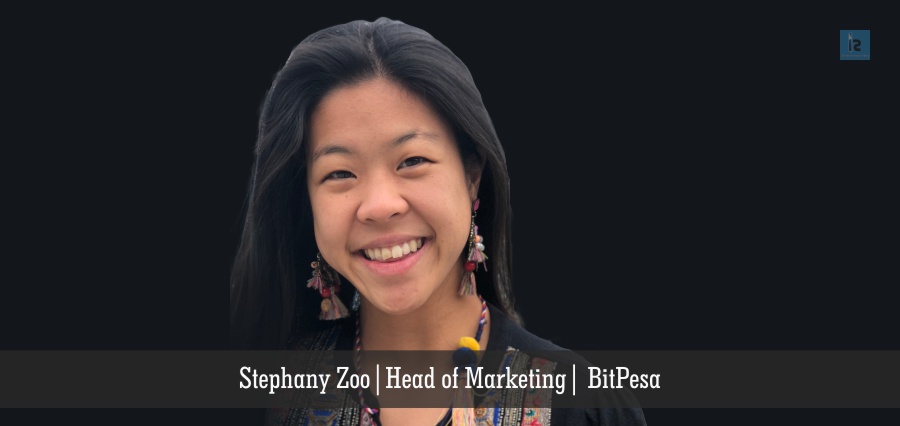In an Interview with Insights Success, Stephany Zoo, Head of Marketing, Branding, and Communications at BitPesa, shares about her journey and contribution through BitPesa. BitPesa is a digital foreign exchange and payment platform for frontier markets. Stephany is obsessed with making things happen. She is a brand builder, an aggressive project manager and a passionate network architect.
Below are the highlights of the interview between Stephany Zoo and Insights Success.
How do you diversify your organization’s offerings to appeal to the target audience?
One of the reasons that BitPesa is one of the few truly Pan- African companies is because we don’t think about it from a product standpoint— we think about it from the customer standpoint. How do we look at macroeconomic trends and greater financial landscapes to create problems that address B2B financial inclusion? It’s not about building a product because we think it’s appropriate. Instead, it’s about understanding the root causes of a challenge and building from the ground up.
What were the past experiences, achievements or lessons that have shaped your journey?
Living across 3 continents and 6 countries, I’ve been able to really immerse myself in markets, even when they are not my own. I really enjoy the process of market research, of networking and feeling your way around a demographic. Since BitPesa operates across 10 African countries, it’s constantly a challenge to adapt ourselves into each country and each customer segment. Within this role, I have had the opportunity to explore each country we expand into directly.
How do you strategize your game plans to tackle competition in the market?
I don’t know if I really think about outmaneuvering the competition, because then even when you win, you are only one step before your competition. However, if you come from a point of inspiration and more organic customer centricity, then you will be many steps before your competition.
What were the primal challenges and roadblocks you faced during the initial phase of your career as a marketing leader?
I never studied marketing, and to this day when young people tell me that they want to study it in school I think it’s silly. Marketing is about trying new tactics, being analytical enough to dissect the results, and being disciplined enough to optimize the campaign. You can’t get a feel for the marketing unless you try.
Because I studied economics, a lot of my peers always viewed marketing as unsubstantial and fluffy. However, recently there’s a whole movement of “growth hackers” who are incredibly influential in expanding and scaling businesses, and all they’re really doing is out-of-the-box marketing. I think this really helped much of my community take my role a lot more seriously.
What inspires you to become an influential marketing leader?
I don’t think anyone sets out to be influential. One becomes influential not only by doing good work, but by being able to replicate and then teach the method for good work. When I worked in China in the early 2010’s, people were concerned about the reliability of data. Now working in Sub-Saharan Africa, people are worried about the dearth of data. In these spaces, people get lucky and are able to ride a trend to get a huge wave of customer acquisition. However, it’s in these spaces that I am trying to create a process and actually create a robust marketing practice.
Where do you see yourself in the near future and what are your future goals?
It is very rare for CMO’s to be chosen to become CEO’s. Usually it is the COO or CFO that rises to lead a company. However, I hope to help change the view of CMO’s as strategic and pivotal business roles.
What is your advice for budding and emerging marketing leaders?
B2C may seem funner and sexier, but it’s B2B that really makes a world of difference. B2C is based on trends, while B2B is based on behavioral economics and psychology. Focus on the things that last.


